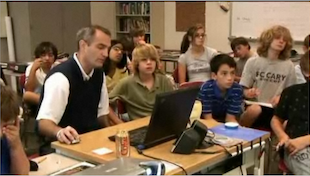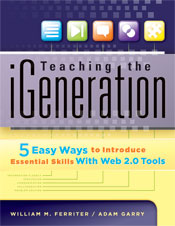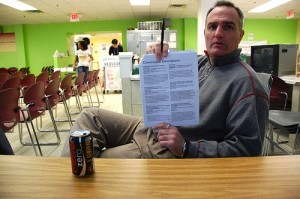Tempered, with an Edge
Classroom teacher Bill Ferriter won’t need much introduction if you’re a middle grades educator with some geeky, edtech edges. His blog The Tempered Radical, which lives on the Teacher Leaders Network website, is widely followed by such folks. But if you visit the blog, you’ll find that Bill is no “The Webtools Rule!” kind of guy. He’s all about application and engaged learning. In addition to his digitally savvy Teaching the iGeneration, he’s the author of several books on professional learning communities and school-level leadership in the post-industrial age.
Bill is also an outspoken critic of misguided education policy, a frequent topic at the Radical. A former North Carolina regional teacher of the year, Bill has been a columnist for ASCD’s Educational Leadership magazine and for the National Staff Development Council (now Learning Forward), which selected his co-authored Building a Professional Learning Community at Work: The First Year as its 2010 Book of the Year.

1. When I first met you, back in 2003, you were a mild-mannered middle school teacher in Cary, NC. Now you’re the published author of four books, an internationally known Radical blogger, a speaker and workshop leader on PLC and digital integration topics… and still a sixth grade teacher. What’s up with all that?
I think there are two answers to your question, John. The glass half-full response is that I’m completely jazzed to have the opportunities that I do to shape thinking around our profession. With the help of folks like MiddleWeb and The Center for Teaching Quality — two organizations that have worked systematically to tap into the wisdom and knowledge of practicing classroom teachers — I’ve seen my thinking amplified again and again over the years.
That’s cool, isn’t it?
I’m FINALLY able to make a meaningful difference on the teaching profession — which has been a goal of mine for long, long time. Digital spaces for publishing — paired with a bunch of champions who have encouraged me to start sharing what I know in those spaces — have given me a voice that I never knew I had. That’s a lesson that EVERY teacher needs to learn. We CAN be powerful change agents as long as we’re willing to use new opportunities to elbow our way into the important conversations happening online.
We CAN be powerful change agents if we are willing to elbow our way into the important conversations happening online.
The glass half-empty response is the important rest of the story, though. I spend hours and hours and hours hunched over a computer every week — away from my wife AND my 2 year old daughter — churning out content for my blog, churning out content for my next book, and churning out content for my next professional development date simply because I can’t afford to pay my bills on the salary that I make as a full-time classroom teacher.
I have 19 years of experience. I have a Master’s degree AND National Board Certification — which carries a 12% salary supplement here in North Carolina — and I still struggle to provide the basics for my family. The tradeoff: I HAVE to churn out engaging content. I HAVE to find people who are willing to hire me for professional development. I HAVE to find another book to write or another presentation to give — even if that means working 30+ part time hours every week and breaking my daughter’s heart because I can’t ever play dress-up or go to the park with her.
That’s wrong, John. No wonder we can’t keep accomplished teachers in the classroom.
2. We love to read The Tempered Radical, a blog you manage like a maestro. What are three of your favorite posts ever, and why?
Talk about a tough question. Writing is such a deeply personal act of reflection for me that all of my blog posts have changed who I am as a thinker and as a classroom teacher in some way. Here’s three, though, that still resonate with me:
The Monster You’ve Created
Testing is ruining our schools. Plain and simple. It’s stripping the joy out of teaching AND learning. It’s forcing educators to walk a moral tightrope, wrestling with doing what we know is right for our students and what we know will drive numbers on end-of-grade exams. The pressure and tension between those two competing positions can be crushing to teachers who care. This post shows just how intense that pressure can be.

Nothing has changed the way I teach more over the past few years than having the opportunity to network with other teachers in social media spaces. My digital peers are constantly pushing me to reconsider what good instruction looks like, and that’s cool. Just as important, nothing has changed the way I learn more than having the opportunity to network with other teachers in social media spaces. This post — which starts in the shower one morning before heading off to school — is a tangible example of how social media spaces can make learners more efficient. That’s a lesson that everyone — teachers AND students AND administrators — need to learn.
This One’s for You, Dad
Probably my biggest fan over the past several years has been my Dad. Even as he fought his way through chemo treatments for lung cancer, he read everything I wrote. When I lost him this spring, it was hard to imagine a world where he wouldn’t be watching and thinking along with me, so I wrote this post as a tribute to him. The real magic, though, happened in the days and weeks that followed: dozens of digital friends — readers of my blog and members of my Twitter network — stopped by to let me know that they were thinking about me. That’s another important lesson for teacher bloggers to learn: Our digital homes and spaces are living, breathing communities filled with people who care about us. How cool is that?
Our digital homes and spaces are living, breathing communities filled with people who care about us. How cool is that?
3. One of the strands in the Radical that caught our eye was a digital scuffle between you and a group of librarians. You pushed them and they pushed back pretty hard. What’s your beef with librarians all about – and how would you respond to The Daring Librarian, who argues in this MiddleWeb interview that the best defense for librarians interested in protecting their position is to “be Damn good at their jobs”?
My beef with librarians has always been a simple one: FAR too many librarians believe that they are the ONLY people in a building who know anything about media literacy and teaching kids how to read with wise eyes and enthusiasm. It tends to come across in comments like this one that a librarian left on my blog a few years back:
How are kids to learn to read for the love of reading if they have no library, no library books, and no library media specialist to guide them through the world of literature? Schools are not considering their best resources – the teacher librarian – in helping teachers switch kids onto reading.
Do you see how hard those kinds of comments can be to swallow for people like me? I’ve spent the better part of my 19-year career as a language arts teacher. Not only do I think I do a pretty good job turning kids on to reading, I’m the one who is held accountable for that work in a way that media specialists can’t possibly understand because they aren’t working in tested positions. No one asks about what the media specialists did and/or didn’t do when reading scores go down. That blame — whether it’s fair or not — rests squarely on the shoulders of classroom teachers.
No one asks about what the media specialists did or didn’t do when reading scores go down.
So if the conversation about librarians is centered around who the REAL media expert is — a thread advanced by many library advocates whenever their positions are in jeopardy because of budget cuts — I think media specialists are starting an argument that they just can’t win. Not only are the kinds of specialized skills that librarians once possessed becoming less valuable as information is more readily available to both teachers and students, the “us-versus-them-ness” of the attitudes that I see expressed as librarians fight for their positions is a real turn-off to classroom teachers. And we are the folks who SHOULD be allies and advocates for media specialists.
My response to Gwyneth is as simple as my beef with her peers: Please encourage librarians to recognize that being “damn good at your jobs” HAS to include recognizing that classroom teachers play a pretty important role in introducing kids to reading, too. Advocate for your work. Stand up for your position. Defend the contributions that you make to schools. But do it in a way that acknowledges that teachers are your peers in the process if you want me to stand next to you in the fight to protect the future of libraries in our schools.

1) Know that publishers WANT your work. One of the first barriers that teachers who want to be authors need to hurdle is recognizing that publishers REALLY DO want to hear what full-time classroom teachers have to say. We’ve been inadvertently taught over the course of our careers to believe that books are written by experts, not teachers. The fact of the matter is that most publishers understand that classroom teachers ARE the experts. If you’re willing to put the time into writing a book — especially a book that shares practical teaching strategies — publishers will line up to see what you have to offer.
2) Start blogging NOW. When people look at my work, they often ask, “How do you find the time to blog AND write books?” What they don’t realize is that much of the content that ends up in my book STARTED as a post on my blog. In fact, if you read through the Ed Tech and PLC posts on my blog, you’d probably get a really good sense for what you’d see in any of my books. Granted, the work in my books is far more organized and polished than the work on my blog, but there are clear parallels between the two spaces.
For teachers interested in being authors, there’s an important lesson to learn: A blog can give you chances to polish your ideas and get feedback on the kind of content that resonates with an audience.
For teachers interested in being authors, that’s an important lesson to learn: A blog can give you chances to polish your ideas. Just as importantly, you can get feedback on the kind of content that resonates with an audience. When a post takes off for me, I know that it’s probably worth incorporating into the work that I do beyond my blog. Finally, bloggers build their own audiences — which can help to convince a publisher to give you a book contract. When a publisher sees that I have 3,000 followers on my blog and another 7,000 followers in Twitter, they know that I’m doing something right.
3) Don’t expect to get rich quick. The not so sexy side of educational publishing is that a book isn’t going to make you all that much money by itself. After grinding hard to write four books in three years, I probably pull in $8,000 per year in royalties off of book sales — and because sales of individual titles tail off after 3 or 4 years, I’m constantly working on the next book. That means you have to want to write for the sake of writing — you have to see writing as a way to reflect and to improve your own practice — instead of seeing writing as a ticket to financial security.
4). Stick to strategies, not stories. Most teachers that I know who are interested in writing a book want to tell a story of some kind. Maybe it’s the story of how they were drawn to teaching to begin with or the story of helping students to overcome incredible challenges. Maybe it’s the story of how their school is changing lives and communities. And while those kinds of stories are beautiful and energizing to read, they’re also a dime a dozen. More importantly, those stories don’t make up the kind of books that teachers — who are your most important market — are likely to buy. Instead, they want books centered around teaching/learning strategies. Sharing the ins-and-outs of what works with kids is WAY more important than waxing poetic about our profession. If you use some pertinent story-telling to illustrate your strategies, great.
5) Set aside time to write EVERY WEEK. Sometimes teachers who are interested in being authors forget that writing — like golf or cooking or reading or running or parenting — is a skill that improves with practice. That means if you want to write — and more importantly, you want to write efficiently and effectively — you’ve got to do it often. Every Tuesday night, every Friday night, and every Sunday morning, I spend time behind the keyboard writing. I might be posting on my own blog. I might be crafting a draft of a chapter for a book. I might be putting together an article for a magazine or adding comments on the blogs of other educators that I follow — but I’m writing. A lot. That investment of energy matters if you want to craft products that other people want to read.
There’s no way that I’d recommend teaching as a profession anymore — and that breaks my heart.
5. You’ve been known to blog about the decline and fall of the teaching profession. Would you really not recommend teaching to young folks entering college – or university grads looking for something meaningful to do with their lives as they drift through their 20s and 30s?
I think twice before recommending teaching as a profession — and that breaks my heart. I love what I do. I love the connections that I’ve made with kids over the years and knowing that I’ve been important in their lives really DOES matter.
But I’m convinced that #edpolicy makers — the people who govern our work — aren’t interested in creating the kinds of conditions that teachers and students need in order to be successful. They don’t care about what really works in schools. They care about getting reelected — and as a result, they are hell-bent to implement policies that ring true to voters but that have little real chance of changing the work of teachers and schools for the better.
Take merit pay, for example. There’s not a SINGLE bit of proven research that pay for performance works in knowledge-driven professions like education. What’s more, dozens and dozens of pay-for-performance plans have failed in education over the past decade and more. Businesses, economists, and nations with highly rated educational systems are all walking away from pay for performance as a strategy for positive change.
And yet educational policymakers — including the Secretary of Education — introduce or tout new merit pay plans every single year.
At the very least, that’s failed policy. At the worst, it’s complete stupidity. But it’s the reality for classroom teachers today and it’s likely to be the reality for classroom teachers tomorrow. Wrestling with the consequences of bad policies is the part of the job that leaves me the most exhausted — and it’s the reason that most teachers beginning careers in this era never make it beyond 5 years in the classroom.
Wrestling with the consequences of bad policies is the part of the job that leaves me the most exhausted.
Does this make any sense?
Basically what I’m saying is that working with kids is nothing short of a remarkable opportunity. It is who I am. It’s what I believe in. I know that it matters more than anything else that I do in my life. But working in today’s public schools can be nothing short of a nightmare because under-informed policymakers continue to make choices that serve their best interests but not the best interests of students or teachers. That’s the way I see it. It’s a sad, sad state of affairs.
Thanks, Bill, for taking the time to share the advice and the honest opinion. We’ll continue to follow your thinking on these and other topics at your always provocative blog The Tempered Radical.






























I am a teacher-librarian and I agree with you about the roles of teachers and librarians. The teachers are the front lines with kids. While I would love to be in front of the same kids every day, that is just not possible as a librarian. Librarians are the support…. the backup… the colleague of the teacher. We need to work TOGETHER to make education great for kids. I feel that my job is to support teachers and students and I most frequently help students through teachers or in cooperation with them.
Now if only I could get all of my teachers to realize that I am here to help them and that I have teaching experience, technology skills and research time that they can rely on. That word “teacher” in front of librarian is real. Unfortunately, many teachers don’t think of librarians as teachers and close themselves off to the possibilities of collaboration to protect “their” classroom. I LOVE to collaborate with teachers (and therefore the students) and get great satisfaction when students see the cooperation between us. Then the students see the “teacher” in me!
Katherine wrote:
Unfortunately, many teachers don’t think of librarians as teachers and close themselves off to the possibilities of collaboration to protect “their” classroom. I LOVE to collaborate with teachers (and therefore the students) and get great satisfaction when students see the cooperation between us.
– – – – – – – – – – – – – – – – –
Hey Katherine,
Thanks for stopping by and sharing your thoughts. Jazzed to hear that you think there’s some logic in my position on the role that classroom teachers play in encouraging reading.
And I’m with you on the need for there to be more collaboration between classroom teachers and librarians. I’ll be the first to admit that I almost never reach out to form those partnerships with my librarians.
But that’s not because I don’t WANT to collaborate — or that I don’t see the librarian as a knowledgeable partner. That’s simply because collaboration takes coordination — we have to find the time to meet and to brainstorm and to plan.
Unfortunately, that’s time that classroom teachers almost never have. We’re already usually committed to two or three planning meetings every week — with core teams, with content teams, with grade level teams — and we have traditional tasks like grading papers and emailing parents to tackle.
Added up, those responsibilities make it difficult for us to find time for more collaboration even if that collaboration has the potential to be productive.
Does that make sense?
Bill
Greaaaaat interview. Don’t tell anyone, but I actually know media center specialists who were quietly (shhh! and I mean it) supporting Bill in the Great Librarian Smackdown. My favorite @plugusin column at the Radical was also the one for your Dad.
Only place I disagree with Bill? I still urge people (young and old) to go into teaching. Because if we don’t, who will? You can’t make an admittedly godawful situation better by withdrawing and taking your acolytes with you, and leaving only those who believe education is an entrepreneurial “opportunity culture” behind.
Nancy wrote:
Only place I disagree with Bill? I still urge people (young and old) to go into teaching. Because if we don’t, who will? You can’t make an admittedly godawful situation better by withdrawing and taking your acolytes with you, and leaving only those who believe education is an entrepreneurial “opportunity culture” behind.
– – – – – – – – — – – – – – – – – – – – – –
Hey Pal,
Great to see you here. You know that your support means everything to me.
And I’m with you on the “if not us, then who?” line of thinking — but I’ve become so pessimistic about the actual probability of seeing change that it almost doesn’t seem worth it anymore.
Isn’t that frightening? It’s seems like a Sisyphean effort — and that leaves me exhausted.
While I’d like to believe that change is really possible from the ground up, I just don’t — which is why I think twice about recommending a profession to others that has nothing but a ground floor.
Any of this make sense?
Bill
Katherine’s observation about teacher culture — that too many teachers still defend “their” classroom from all comers — seems to me to be key to the teacher librarian issue. I know of Bill’s work with the DuFours and (most important) in his own school to promote professional learning communities. A colleague of mine who teaches in Massachusetts made sure during a trip to central North Carolina that he visited in Bill’s classroom. He was welcomed and reported later than he learned more about teaching and tech infusion than he thought possible in a single day. I do think the culture is shifting as more faculties develop a partnership outlook, but it’s too slow, too slow.
John wrote:
I do think the culture is shifting as more faculties develop a partnership outlook, but it’s too slow, too slow.
– – – – – – – – – – – – –
You know, John — Most of the teachers that I know are all about collaborating with colleagues no matter where they are working or what positions that they are in.
The hitch is that no matter how useful collaboration is, we still only have a limited amount of planning time during the course of a week AND we still have a heaping boatload of individual planning responsibilities that we have to tackle.
Which means we weigh the perceived benefits of a collaborative partnership against the additional time, energy and effort that it will take to pull that collaborative partnership off. Most of the time, outside of the collaborative partnerships with people on our interdisciplinary teams and/or our content teams, no amount of value can replace the loss of our remaining time for completing those individual responsibilities.
Does this make sense?
What I’m saying, I think, is that collaboration is great but it’s time consuming. That means some collaborative opportunities fall by the wayside no matter what.
Rock on,
Bill
Hi, Bill! I really enjoyed reading your interview, and I was already thoroughly impressed with you.
I hear you when you say you are pessimistic about seeing changes in education. In speeches I give, I sometimes liken education to “Ground Hog Day” – the movie. We just keep living the same day over and over because we just can’t get it right. But if you didn’t believe – didn’t still have hope – you wouldn’t be doing what you are doing now. And you ARE making a difference!
Like Nancy, I’d still recommend the teaching profession because it’s a passion-driven profession that can make a difference for kids, even with a bunch of non-educators (and maybe non-educated) making the policy decisions. If teachers aren’t there to push back, to keep believing and understanding and advocating, then what would happen?
Some day something good is bound to happen. Until then . . ,. I’m with you and Nancy and a lot of other great teachers and friends . . . we just keep plugging.
Anne